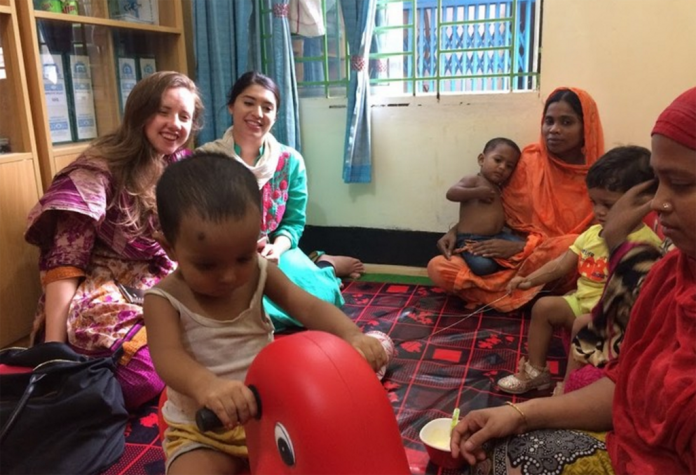
UNIVERSITY PARK, Pa. — Not every Penn State student can say her research has taken her halfway across the globe, but senior Emily Seiger can. The Lewisberry, Pennsylvania, native spent three weeks in Bangladesh conducting research related to food safety and hygiene practices.
Background
Seiger is a community, environment and development (CED) major with minors in international agriculture and nutritional sciences who also is a member of the Schreyer Honors College. By studying some of the social and scientific aspects of nutrition practices and helping to collect data in affected communities, Seiger is gaining insight into problems related to food safety, hygiene and food security around the world.
At Penn State, Seiger works with nutrition professor Laura E. Murray-Kolb who is part of a team of researchers conducting a nutrition study — the Malnutrition and Enteric Disease Project — in eight locations around the world, including Bangladesh. The study follows children from birth until age 5, monitoring their nutrient statuses and cognitive functions. During her time in Bangladesh, Seiger was involved with the International Centre for Diarrhoeal Disease Research, which is a hospital as well as a research institute where the study was conducted.
Bangladesh
One of the reasons Seiger went to Bangladesh had to do with a strange data correlation in the study. Data showed an unexpected relationship between child development and protein intake for children under 2. Protein intake is important for brain development, so it would make sense for there to be a positive relationship protein intake and child development. However, a negative relationship was found between protein intake from meat, fish and poultry sources and child development. These results created an interesting question — what was causing the cognitive deficits? Seiger hypothesized unsafe food hygiene practices during preparation and storage of protein sources may have increased incidence of illness in these children, which negatively impacted their development.
As part of the study, Seiger developed a questionnaire and had the chance to sit in on interviews with participating mothers. Interviewers asked the mothers about things such as their hand-washing techniques, food storage and their child’s eating habits outside of the home. As the study is not yet complete, the full range of data is not available for analysis. However, Seiger has found some interesting data about food storage.
“Most of the mothers don’t have refrigerators,” she explained. “Many of them store the leftovers with the raw, unrefrigerated food. Food storage is one possible explanation for the data we have collected.”
Seiger is looking forward to seeing the full scope of the data. “I’m really interested in research. The more I do it, the more I enjoy it and I think it’s super important. My career interests are to combine the science of nutrition with the social science of CED to get a more holistic view of food security,” she added.
What’s next?
Later this month, Seiger will be one of five students from the college to attend the 2017 Borlaug Dialogue International Symposium at the World Food Prize, set for Oct. 18-20 in Des Moines, Iowa. The World Food Prize is an international honor that recognizes individuals who have helped improve “the quality, quantity or availability of food in the world.” The Borlaug symposium brings together international leaders, farmers, agribusiness executives, non-governmental organizations and development experts to address the most critical issues facing global food security.
Seiger applied to attend the World Food Prize events after hearing about it from Daniel Tobin, who is in charge of the international agriculture minor. After filling out a short application, she was selected to attend the event. Seiger added, “I’m really excited. It’s going to a great learning experience.”
As most of Seiger’s background is in nutrition, she is interested to learn more about the agricultural side of things. “I want to learn about the problems agriculture can solve and I’m interested to see whether or not nutrition will play a big role in what the speakers will be talking about and what they are considering for solutions. I’m looking forward to see the interaction between agriculture and nutrition,” she added.
Funding for Seiger’s travel was provided by the INTAG Undergraduate International Research Competitive Grants program.












